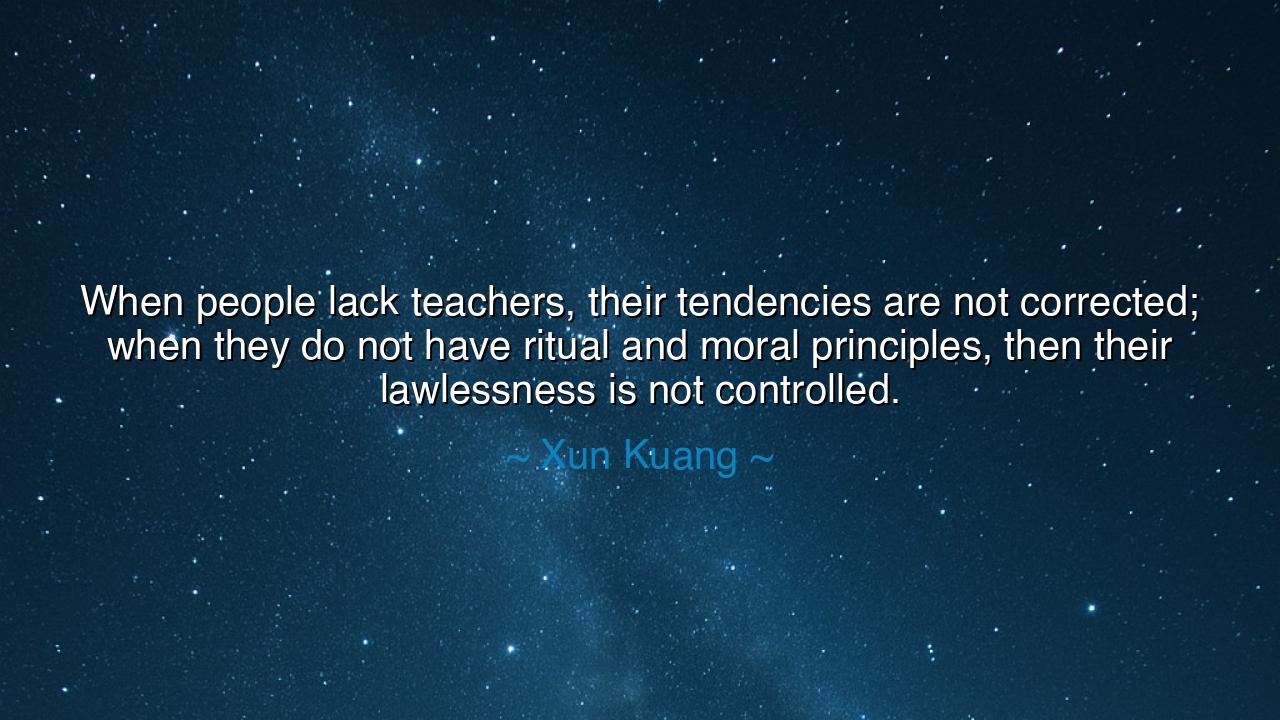
When people lack teachers, their tendencies are not corrected;
When people lack teachers, their tendencies are not corrected; when they do not have ritual and moral principles, then their lawlessness is not controlled.






Hearken, children of wisdom, to the words of Xun Kuang, the great Confucian thinker, who proclaimed with solemn authority: "When people lack teachers, their tendencies are not corrected; when they do not have ritual and moral principles, then their lawlessness is not controlled." In these words lies a meditation on the necessity of guidance, discipline, and ethical cultivation. Xun Kuang teaches that humanity, left to itself, drifts toward disorder, and that the presence of teachers and principles forms the backbone of both personal virtue and societal harmony.
The first revelation is that teachers serve as mirrors and guides for the soul. Without one to instruct, correct, and exemplify, tendencies toward greed, pride, or indolence may flourish unchecked. Just as a tree left untended may twist and grow unevenly, so too may the human mind and spirit falter in the absence of disciplined guidance. Teachers illuminate the path of wisdom and righteousness, shaping the character of those who would otherwise wander in ignorance.
Xun Kuang further emphasizes that the guidance of teachers alone is insufficient without rituals and moral principles. These structures provide the framework within which conduct can be disciplined and harmonized. Rituals, whether in family, community, or society, cultivate respect, order, and reflection. Moral principles instill the innate compass of right and wrong, restraining impulses that might otherwise lead to chaos or cruelty. Together, teachers and ethics form the pillars of civilized life.
History provides a vivid example. Consider the foundation of Confucian education in ancient China, where scholars devoted themselves to study, ritual, and moral cultivation. Emperors and commoners alike were taught not only to read and write but to act with propriety, fairness, and integrity. In this environment, personal tendencies toward selfishness or discord were tempered, and society functioned with harmony and order. Without such guidance, disorder and lawlessness could easily overtake the state.
The teaching of Xun Kuang resonates beyond distant history. In the modern era, Nelson Mandela, though imprisoned and surrounded by hardship, benefited from the moral and ethical frameworks he had internalized and the guidance of mentors who reinforced justice, patience, and humility. These principles restrained impulses toward vengeance and cultivated the lawful, measured leadership that would heal a nation. Here again, the presence of teachers and guiding principles proved crucial in shaping character.
Xun Kuang’s words also carry a warning: societies neglectful of ethical instruction and moral frameworks risk anarchy, corruption, and decay. Education and ritual are not mere adornments; they are lifelines of civilization. Without them, the natural tendencies of desire, pride, and impatience may dominate, resulting in the collapse of order both within the self and in the community.
Practically, the lesson is clear: seek out teachers, mentors, and moral exemplars, and immerse oneself in the study of ritual, ethics, and tradition. Observe, learn, and internalize the guiding principles that structure life with balance, justice, and propriety. Correct personal tendencies before they harden into vice, and cultivate habits that restrain impulses in service of the greater good.
Thus, let this teaching echo through the generations: the absence of teachers and principles leaves humanity adrift, yet their presence forms the foundation of virtue, lawfulness, and harmony. Attend diligently to the guidance of wise mentors, practice moral discernment, and observe the rituals that cultivate order. In these acts, the soul finds correction, the mind finds discipline, and society finds the harmony that endures through the ages.






AAdministratorAdministrator
Welcome, honored guests. Please leave a comment, we will respond soon